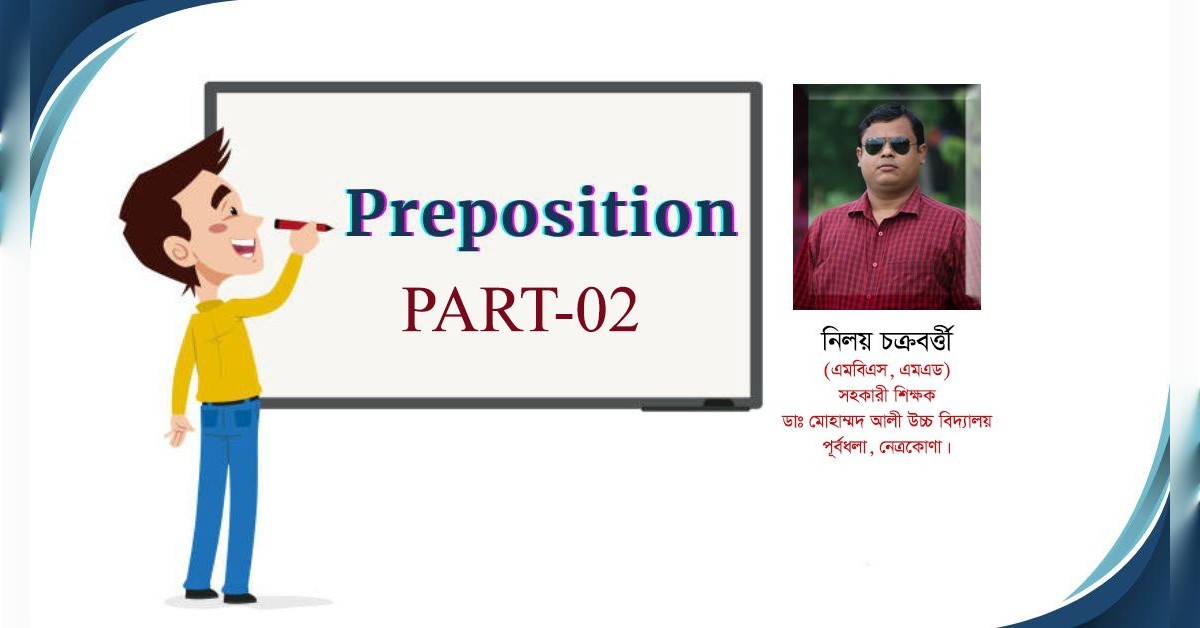Note:- তবে charge শব্দটির পর with হয়।
- The man was charged of stealing. ( incorrect )
The man was charged with stealing. ( Correct )
- Do you know that the boy has been charged of taking drugs? ( Incorrect )
Do you know that the boy has been charged with taking drugs? ( Correct )
- Aim এরপর at হবে to নয়।
- The farmer aimed to the tiger. ( Incorrect )
The farmer aimed at the tiger. ( Correct )
- Jonathan aimed to the track. ( Incorrect )
Jonathan aimed at the track. ( Correct )
- Ashamed এরপর of হয় from নয়।
- Nitu and Nasim were ashamed from not coming here. ( Incorrect )
Nitu and Nasim were ashamed of not coming here. ( Correct )
- They are ashamed from their misconduct. ( Incorrect )
They are ashamed of their misconduct. ( Correct )
- Arrive এরপর at/in হয়। to নয়।
- My cousin arrived to London. ( Incorrect)
My cousin arrived in London. ( Correct )
- Prime minister along with other ministers has arrived to Australia last year.(Incorrect)
Prime minister along with other ministers has arrived in Australia last year. (Correct)
- Acquit এরপর of হয়। from নয়।
- The jury acquitted him from murder. ( Incorrect )
The jury acquitted him of murder. ( Correct )
- The jade was acquitted from the charge of extremism. ( Incorrect )
The jade was acquitted of the charge of extremism. ( Correct )
- Anxious মানে উদ্বেগ বোঝালে এর পর about হবে। অন্যদিকে anxious মানে অতি উৎসাহ বোঝালে এর পর for হবে।
- I am anxious for my father’s health. ( Incorrect )
I am anxious about my father’s health. ( Correct )
- My elder brother is anxious about my result. ( Incorrect )
My elder brother is anxious for my result. ( Correct )
- Annoy এরপর with হয় যদি ব্যক্তি দ্বারা বিরক্ত বোঝায়। অন্যদিকে annoy এর পর at হয় যদি বন্তু/ব্যক্তির আচরণে বিরক্ত বোঝায়।
- Nitu was annoyed at him. ( Incorrect )
Nitu was annoyed with him. ( Correct )
- I was annoyed with his coming late. ( Incorrect)
I was annoyed at his coming late. ( Correct )
- The man is annoyed with my behavior. ( Incorrect )
The man is annoyed at my behavior. ( Correct )
- Benefit এর পর by হয় from নয়।
- Every child should be benefited from it’s parents money . ( Incorrect )
Every child should be benefited by it’s parents money. ( Correct )
- The mosque will be benefited from the charitable fund my father founded. (Incorrect)
The mosque will be benefited by the charitable fund my father founded. (Correct)
Z‡e Benefit kãwU noun n‡j Gi ci from nq|
The old man got much benefit of the trust. ( Incorrect )
The old man got much benefit from the trust. ( Correct )
GLv‡b Determiner Ges preposition Gi gv‡S e¨en„Z nIqv benefit kãwU noun n‡q‡Q|
- Believe Gi ci in nq| to bq|
- He believes to his religion. ( Incorrect )
He believes in his religion. ( Correct )
`ªóe¨:- Believe in gv‡b wek¦vm Kiv (to have faith in) Ab¨w`‡K ïay believe g‡b mZ¨ e‡j we‡ewPZ nIhv (regard as true)
- I believe in his strength. ( Avwg Zvi kw³‡Z wek¦vm Kwi)
They believed what I did. (Avwg hv K‡iwQjvg Zv Zv‡`i Kv‡Q mZ¨ e‡j g‡b n‡q‡Q)
Believe GKwU stative verb ZvB Gi continuous tense nq bv|
We are believing in astrology. ( Incorrect )
We believe in astrology. ( Correct )
- Bias against gv‡b Kv‡iv weiƒ‡× cÿcv‡Zi Awf‡hvM|Ab¨w`‡K bais towards gv‡b Kv‡iv c‡ÿ cÿcvwZZ¡|
- The jury was biased towards our rivals. (c‡ÿ cÿcvZ)
The jury was biased against our rivals. (weiƒ‡× cÿcvZ)
- He is biased against the new law. (weiæ‡× cÿcvZ)
He is bias towards the new law. (c‡ÿ cÿcvZ )
- Boast Gi ci of/about nq| for bq|
- Marry boasted for her wealth. ( Incorrect )
- Marry boasted of her wealth. ( Correct )
- Burst Gi ci into nq| in nq|
- Some politicians burst in tears to see the mutiny. ( Incorrect )
Some politicians burst into tears to see the mutiny. ( Correct )
- The girl burst in tears. ( Incorrect )
The girl burst into tears. ( Correct )
- Buy Gi ci `vg D‡jøL _vK‡j for nq| with bq|
- I bought the shirt with five hundred taka. ( Incorrect )
I bought the shirt for five hundred taka. ( Correct )
- The government bought wheat with one crore taka. ( Incorrect )
The government bought wheat for one crore taka. ( Correct )
- `vg D‡jøL bv _vK‡j At nq|
- I bought the shirt for a high price. ( Incorrect )
I bought the shirt at a high price. ( Correct )
- We have bought this book for the highest amount. ( Incorrect )
We have bought this book at the highest amount. ( Correct )
- `vg wba©viY Kiv n‡q‡Q †evSv‡j At nq|
- The price of the land was fixed with 50 lac taka. ( Incorrect)
The price of the land was fixed at 50 lac taka. ( Correct )
- Nitu fixed the price of the land with one crore taka. ( Incorrect)
Nitu fixed the price of the land at one crore taka. ( Correct)
- Capable Gi ci of nq| for bq|
They are capable for completing the work. ( Incorrect )
They are capable of completing the work. ( Correct )
- Complain Gi ci for/against nq bv|wKš‘ of nq|
The people usually complain for/against load shielding. ( Incorrect )
The people usually complain of load shielding. ( Correct )
- Z‡e Complaint Gi ci against e¨en„Z nq|
He lodged a complaint for us. ( Incorrect )
He lodge a complaint against us. ( Correct )
- Careful Gi ci of nq| for bq|
You should be careful for your exam. ( Incorrect )
You should be careful of your exam. ( Correct )
- Congratulate Gi ci on nq| for bq|
I congratulate you for your success. ( Incorrect )
I congratulate you on your success. ( Correct )
Z‡e Thesis ev Ab¨ †Kvb M‡elYvi †ÿ‡Î for nq|
‡hgb:- I congratulated him for his research.
- Consist Gi ci of nq| from bq|
A week consists from seven days. ( Incorrect )
A week consists of seven days. ( Correct )
- g‡b ivL‡eb Consist kãwUi continuous tense Ges passive nq bv|
- The team is consisting of eleven players. ( Incorrect )
The team consists of eleven players. ( Correct )
- The committee is consisted of seven members. ( Incorrect )
The committee consists of seven members. ( Correct )
- Confidence Gi ci in nq| about bq|
I have confidence about his potentiality. ( Incorrect )
I have confidence in his potentiality. ( Correct )
- Confidence kãwU adjective n‡j Zvi ci of nq|
I am confident on my prosperity. ( Incorrect )
I am confident of my prosperity. ( Correct )
- Z‡e In confidence gv‡b nj †Mvcb Kiv|
I have informed you the issue in confidence. ( Avwg welqwU †Mvc‡b †Zvgv‡K Rvwwb‡qwQ)
- Clash Gi ci with nq| against bq|
He clashed against his friend. ( Incorrect )
He clashed with his friend. ( Correct )
- Comment Gi ci on/upon nq| about bq|
They commented about me. ( Incorrect )
They commented on/upon me. ( Correct )
- Composed Gi ci of nq| from/with bq|
It is composed with some good components. ( Incorrect )
It is composed of some good components. ( Correct )
- Conform Gi ci to nq| with bq|
He had to conform with the rules. ( Incorrect )
He had to conform to the rules. ( Correct )
- Z‡e Comply Gi ci with nq| to bq|
They should comply to my proposal. ( Incorrect )
They should comply with my proposal. ( Correct )
- Cure Gi ci of nq| from bq|
Did the medicine cure him from cancer? ( Incorrect )
Did the medicine cure him of cancer? ( Correct )
- Z‡e Cure kãwU noun n‡j for e¨en„Z n‡Z cv‡i|
There is no cure of blood cancer. ( Incorrect )
There is no cure for blood cancer. ( Correct )
- GKwU cwiev‡i Rb¥MªnY Kiv †evSv‡Z Come of nq| from bq|
Nitu has come from a noble family. ( Incorrect )
Nitu has come of a noble family. ( Correct )
- wKš‘ †Kvb ¯’v‡b Rb¥MönY Kiv †evSv‡Z Come from nq| of bq|
Nitu has come of Nepal. ( Incorrect )
Nitu has come from Nepal. ( Correct )
- Come/go by bus/train nq| with bq|
They went there with bus, but Nitu came with train. ( Incorrect )
They went there by bus, but Nitu came by train. ( Correct )
g‡b ivLyb:-
We go on foot/on a donkey/on a bicycle/in a taxi/in a cab/in a carriage/by boat/by train/by bis/by sea/by land
- Covered Gi ci with nq| by bq|
The book is covered by a red cover. ( Incorrect )
The book is covered with a red cover. ( Correct )
- Deprive Gi ci of nq| from bq|
He is deprived from the property. ( Incorrect )
He is deprived of the property. ( Correct )
- Doubt Gi ci of nq| for bq|
I have no doubt for his qualification. ( Incorrect )
I have no doubt of his qualification. ( Correct )
- Divide Gi ci into nq| in bq|
My mother has divided the oranges in four parts. ( Incorrect )
My mother has divided the oranges into four parts. ( Correct )
- Dressed Gi ci in nq| with bq|
- The jill dressed with yellow. ( Incorrect )
The jill dressed in yellow. ( Correct )
- The student dressed with white is my cousin. ( Incorrect )
The student dressed in white is my cousin. ( Correct )
- Depend Gi ci on/upon nq| from bq|
Everything depends from him. ( incorrect )
Everything depends on/upon him. ( Correct )
- Doubt Gi ci of/about nq| for bq|
I have doubt for his passing the exam. ( Incorrect )
I have doubt of/about his passing in the exam. ( Correct )
- Doubtful Gi ci about nq|
I was doubtful for her success. ( Incorrect )
I was doubtful about her success. ( Correct )
- Disappointed Gi ci in/at n‡e hw` Avgiv hv Avkv K‡iwQjvg Zv bv †c‡q nZvk nB| Ab¨w`‡K Avgiv †Kvb wKQy †c‡Z e¨_© n‡j disappointed Gi ci of nq|
- He was disappointed from my attitude. ( Incorrect )
He was disappointed in my attitude. ( Correct wZwb Av‡iv fv‡jv wKQz Avkv K‡iwQ‡jb )
- I am disappointed in failing to make the agreement. ( Incorrect )
I am disappointed of failing to make the agreement. ( Correct GLv‡b Av‡iv fv‡jv wKQz bq eis Pzw³wU bv nIqv‡Z Avwg nZvk )









Be First to Comment